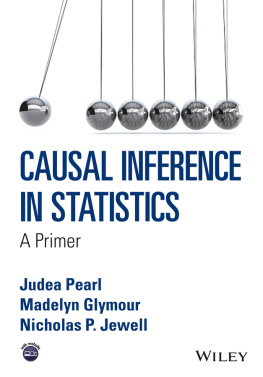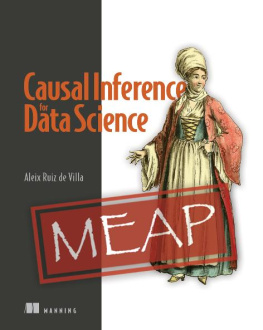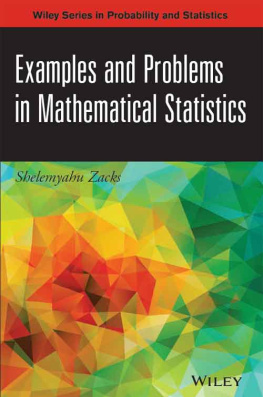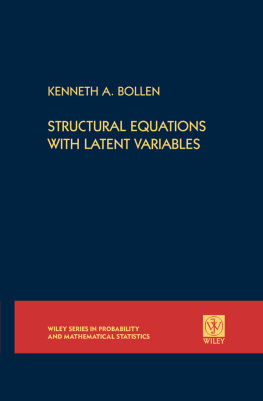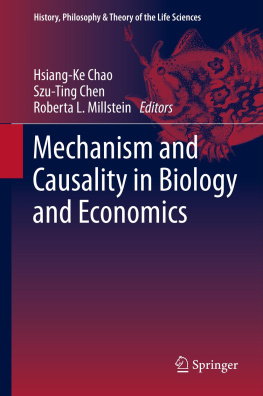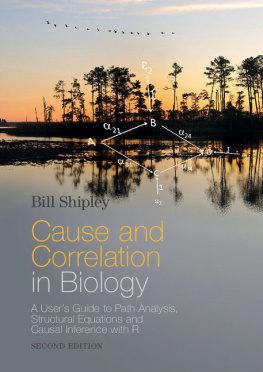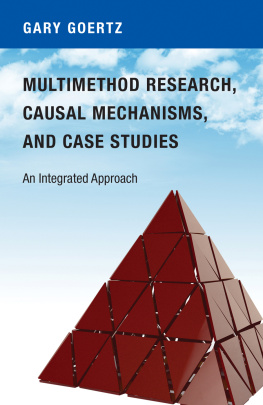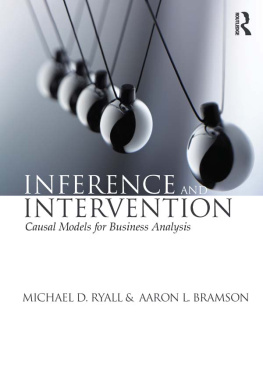CAUSALITY
Models, Reasoning, and Inference Second Edition
Written by one of the preeminent researchers in the field, this book provides a comprehensive exposition of modern analysis of causation. It shows how causality has grown from a nebulous concept into a mathematical theory with significant applications in the fields of statistics, artificial intelligence, economics, philosophy, cognitive science, and the health and social sciences.
Judea Pearl presents a comprehensive theory of causality which unifies the probabilistic, manipulative, counterfactual, and structural approaches to causation and offers simple mathematical tools for studying the relationships between causal connections and statistical associations. The book opens the way for including causal analysis in the standard curricula of statistics, artificial intelligence, business, epidemiology, social sciences, and economics. Students in these fields will find natural models, simple inferential procedures, and precise mathematical definitions of causal concepts that traditional texts have evaded or made unduly complicated.
The first edition of Causality has led to a paradigmatic change in the way that causality is treated in statistics, philosophy, computer science, social science, and economics. Cited in more than 2,800 scientific publications, it continues to liberate scientists from the traditional molds of statistical thinking. In this revised edition, Pearl elucidates thorny issues, answers readers' questions, and offers a panoramic view of recent advances in this field of research.
Causality will be of interest to students and professionals in a wide variety of fields. Anyone who wishes to elucidate meaningful relationships from data, predict effects of actions and policies, assess explanations of reported events, or form theories of causal understanding and causal speech will find this book stimulating and invaluable.
Judea Pearl is professor of computer science and statistics at the University of California, Los Angeles, where he directs the Cognitive Systems Laboratory and conducts research in artificial intelligence, human reasoning, and philosophy of science. The author of Heuristics and Probabilistic Reasoning, he is a member of the National Academy of Engineering and a Founding Fellow of the American Association for Artificial Intelligence. Dr. Pearl is the recipient of the IJCAI Research Excellence Award for 1999, the London School of Economics Lakatos Award for 2001, and the ACM Alan Newell Award for 2004. In 2008, he received the Benjamin Franklin Medal for computer and cognitive science from the Franklin Institute.
Commendation for the First Edition
Judea Pearl's previous book, Probabilistic Reasoning in Intelligent Systems, was arguably the most influential book in Artificial Intelligence in the past decade, setting the stage for much of the current activity in probabilistic reasoning. In this book, Pearl turns his attention to causality, boldly arguing for the primacy of a notion long ignored in statistics and misunderstood and mistrusted in other disciplines, from physics to economics. He demystifies the notion, clarifies the basic concepts in terms of graphical models, and explains the source of many misunderstandings. This book should prove invaluable to researchers in artificial intelligence, statistics, economics, epidemiology, and philosophy, and, indeed, all those interested in the fundamental notion of causality. It may well prove to be one of the most influential books of the next decade.
Joseph Halpern, Computer Science Department, Cornell University
This lucidly written book is full of inspiration and novel ideas that bring clarity to areas where confusion has prevailed, in particular concerning causal interpretation of structural equation systems, but also on concepts such as counterfactual reasoning and the general relation between causal thinking and graphical models. Finally the world can get a coherent exposition of these ideas that Judea Pearl has developed over a number of years and presented in a flurry of controversial yet illuminating articles.
Steffen L. Lauritzen, Department of Mathematics, Aalborg University
Judea Pearl's new book, Causality: Models, Reasoning, and Inference, is an outstanding contribution to the causality literature. It will be especially useful to students and practitioners of economics interested in policy analysis.
Halbert White, Professor of Economics, University of California, San Diego
This book fulfills a long-standing need for a rigorous yet accessible treatise on the mathematics of causal inference. Judea Pearl has done a masterful job of describing the most important approaches and displaying their underlying logical unity. The book deserves to be read by all statisticians and scientists who use nonexperimental data to study causation, and would serve well as a graduate or advanced undergraduate course text.
Sander Greenland, School of Public Health, University of California, Los Angeles
Judea Pearl has written an account of recent advances in the modeling of probability and cause, substantial parts of which are due to him and his co-workers. This is essential reading for anyone interested in causality.
Brian Skryms, Department of Philosophy, University of California, Irvine
CAUSALITY
Models, Reasoning, and Inference Second Edition
Judea Pearl
University of California, Los Angeles

CAMBRIDGE UNIVERSITY PRESS
Cambridge, New York, Melbourne, Madrid, Cape Town, Singapore,
Sao Paulo, Delhi, Dubai, Tokyo
Cambridge University Press
32 Avenue of the Americas, New York, NY 10013-2473, USA
www.cambridge.org
Information on this title: www.cambridge.org/9780521895606
Judea Pearl 2000, 2009
This publication is in copyright. Subject to statutory exception and to the provisions of relevant collective licensing agreements, no reproduction of any part may take place without the written permission of Cambridge University Press.
First published 2000
8th printing 2008
Second edition 2009
Printed in the United States of America
A catalog record for this publication is available from the British Library.
The Library of Congress has cataloged the first edition as follows:
Pearl, Judea
Causality : models, reasoning, and inference / Judea Pearl.
p. cm.
ISBN 0-521-77362-8 (hardback)
1. Causation. 2. Probabilities. I. Title.
BD541.P43 2000
122 dc21 99-042108
ISBN 978-0-521-89560-6 Hardback
Cambridge University Press has no responsibility for the persistence or accuracy of URLs for external or third-party Internet websites referred to in this publication and does not guarantee that any content on such websites is, or will remain, accurate or appropriate.
Development of Western science is based on two
great achievements: the invention of the formal
logical system (in Euclidean geometry) by the
Greek philosophers, and the discovery of the
possibility to find out causal relationships by
systematic experiment (during the Renaissance).
Albert Einstein (1953)
TO DANNY
AND THE GLOWING AUDACITY OF GOODNESS
Contents
Preface to the First Edition
The central aim of many studies in the physical, behavioral, social, and biological sciences is the elucidation of causeeffect relationships among variables or events. However, the appropriate methodology for extracting such relationships from data or even from theories has been fiercely debated.


